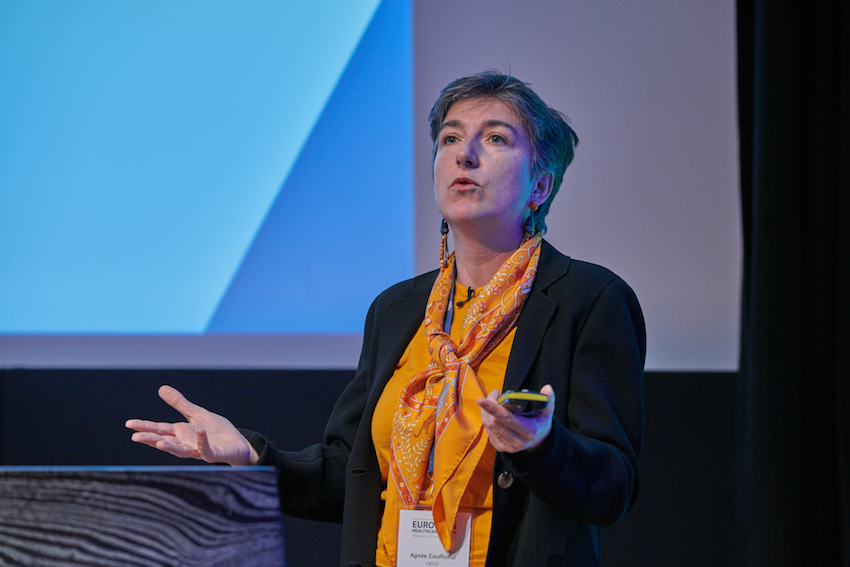With Ipsos Mori's Bobby Duffy having pointed out the importance of funding as a reason why people, particularly in Britain, believe the quality of healthcare in the future may decline, Agnès Couffinhal, a senior economist at the OECD, spoke on the subject of wasteful spending and costs in healthcare systems.
 Highlighting the findings of a recent report by the OECD on this issue, Couffinhal defined waste as follows: services and processes that are either harmful or do not deliver benefits, and excess cost that could be avoided by replacing with cheaper alternatives while giving the same benefits.
Highlighting the findings of a recent report by the OECD on this issue, Couffinhal defined waste as follows: services and processes that are either harmful or do not deliver benefits, and excess cost that could be avoided by replacing with cheaper alternatives while giving the same benefits.
She explained that adverse events occur in around one in 10 hospitalisations – adding at least 10 per cent to hospital costs, while up to 70 per cent could be avoided. Overall, she suggested that “at least a fifth of healthcare spending is, at best, ineffective, and, at worst, wasteful”.
The report distilled healthcare waste into three categories:
- wasteful clinical care – when patients do not receive the right care, eg. duplication of tests and services, low-value care, and avoidable adverse events;
- operational waste – benefits that could be obtained with fewer resources
- eg, medical devices that are purchased but not used, overpriced inputs, and high-cost inputs when cheaper inputs are available; and
- governance-related waste – resources that are unnecessary but taken away from patient care, eg, administrative waste, such as processes that don’t add any value, as well as fraud, abuse and corruption.
Taking the example of antimicrobial prescriptions, Couffinhal suggested that, based on studies on this issue, more than half of these are likely to be inappropriate in general medicine. “This is wasteful,” she explained, “because, of course, we spend money on antimicrobials, but this also contributes to the development of antimicrobial resistance, which has economic and public health consequences.”
Tackling waste
In finding ways to tackle the three elements of waste in healthcare, she first considered clinical waste and underlined the importance of developing the right information system. “The reality is every single patient is different and so you need to have a much finer understanding of why this surgery was done or not,” she said. “What really matters also is how you assess the value of care, and it’s important to incorporate the patient perspective.”
Interestingly, she linked operational waste, in part, to reduced spending in other areas of the healthcare system. So, in England, delays in the discharge of patients on account of a lack of follow-on care provision has been increasing – a trend, she said, that seems to correspond to a shrinking in the financing of long-term care and social care. Couffinhal brought up the case of Norway as a comparison, a country that has created new types of intermediary care facilities to help address this problem.
She added: “You want payment and financial incentives around care so that the patient gets treated in the right place and that no single facility has the incentive to keep them.”
Finally, on the issue of governance-related waste, Couffinhal warned that it is not something that can be changed overnight, but it needs “multiple stakeholders to sit around a table and discuss and identify a list of administrative costs that could be removed without anybody losing anything”.
The Netherlands and Germany are two countries that have made big progress in this area. Said Couffinhal: “Typically, the countries that have been most effective in tackling this form of corruption have dedicated units and specialised departments. They don’t just have hotlines or carry out investigations, but they really go into data mining to see where people might be abusing the system.”
In short, she described the approach to tackling waste as four-pronged:
- acknowledge there is a problem;
- inform and generate publicity around the indicators of waste;
- change the payment incentives; and
- persuade that changing the incentives is the right thing to do.
A difficult but a necessary conversation
Summing up, she explained that the subject of waste is a critical conversation but one that many countries seek to avoid, often for political reasons. Arguing that this is not constructive, Couffinhal said: “Having a conversation about waste is strategic because you can actually release resources and put them into the system. It’s transformative because it really changes the conversation to one about value in the system. It’s also necessary because one of the challenges our health systems face is changing the role of the hospital.”
She added: “It’s not just about hospitals; it’s about the environment that allows us to get the treatment we need as we age and as our societies change.”

